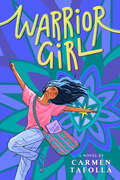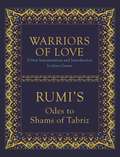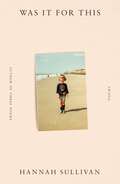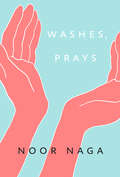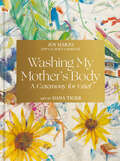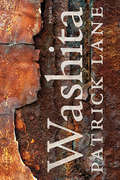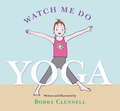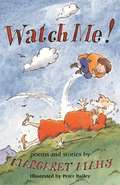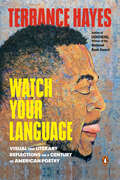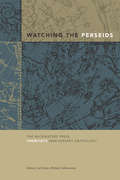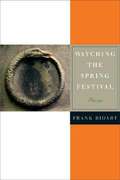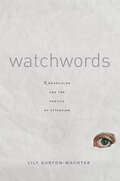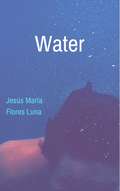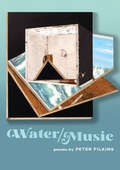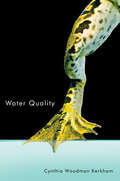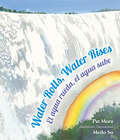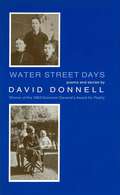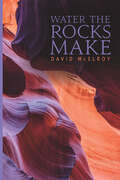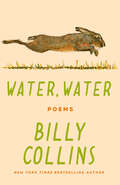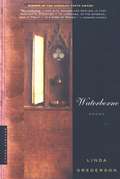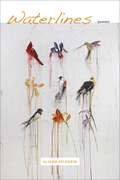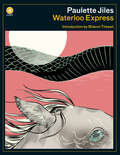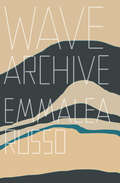- Table View
- List View
Warrior Girl
by Carmen TafollaAn insightful novel in verse about the joys and struggles of a Chicana girl who is a warrior for her name, her history, and her right to choose what she celebrates in life.Celina and her family are bilingual and follow both Mexican and American traditions. Celina revels in her Mexican heritage, but once she starts school it feels like the world wants her to erase that part of her identity. Fortunately, she&’s got an army of family and three fabulous new friends behind her to fight the ignorance. But it&’s her Gramma who&’s her biggest inspiration, encouraging Celina to build a shield of joy around herself. Because when you&’re celebrating, when you find a reason to sing or dance or paint or play or laugh or write, they haven&’t taken everything away from you. Of course, it&’s not possible to stay in celebration mode when things get dire--like when her dad&’s deported and a pandemic hits--but if there is anything Celina&’s sure of, it&’s that she&’ll always live up to her last name: Guerrera--woman warrior--and that she will use her voice and writing talents to make the world a more beautiful place where all cultures are celebrated.
Warriors of Love: Rumi's Odes to Shams of Tabriz
by James Cowan Mevlana RumiIn 1244 a man wrapped in a coarse black coat entered Konya and so into the life of Islam’s most celebrated poet and mystic: Mevlana Jalaluddin Rumi. A wanderer and spiritual vagabond, Shams of Tabriz proceeded to wrestle with Rumi’s soul. What he wanted from his protégé was for him to embody a wilder, more robust spirituality that would enable him to embrace life’s rawness more completely than any saint had done in the past.Warriors of Love is a fresh interpretation of a selection of 49 poems which were written by Rumi as metaphors for his love for God as well as for his friend Shams, the Wild One. In a long introduction on the life and times of Rumi and his friendship with Shams James Cowan also explores the historical facts of their encounter, Sufism, the Mevlevi Order of Dervishes, the new dimension that Shams brought to Islamic spirituality and the importance of friendship as a true path to God.
Was It for This: Poems
by Hannah SullivanA hybrid new collection from the author of Three Poems—about London, terror, new motherhood, the Grenfell Tower fire, and how we live now.Hannah Sullivan’s first collection, Three Poems, won the T. S. Eliot Prize and the inaugural John Pollard International Poetry Prize. Was It for This continues that book’s project, offering a trenchant exploration of the ways in which we attempt to map our lives in space and time.But there is also the wider, collective experience to contend with, the upheaval of historic event and present disaster. “Tenants,” the first poem, is an elegy for Grenfell, written from the uneasy perspective of a new mother living a few streets away. Elsewhere, from the terraces and precincts of seventies and eighties London to the late-at-night decks of American suburbs, intimately inhabited geographies provide reference points and sites for revisiting.Nothing is too small or unlovely to be transfixed by the poet’s attention, from the thin concrete pillars of a flyover to an elderly peacock’s broken train. There is a memorializing strain in the forensic accumulation of detail, but there is also celebration, a keen sense of holding on to and cherishing what we can.
Washes, Prays
by Noor NagaRBC Bronwen Wallace Award winner Noor Naga's bracing debut, a novel-in-verse about a young woman's romantic relationship with a married man and her ensuing crisis of faith.2021 Arab American Book Award - George Ellenbogen Poetry Award, WinnerPat Lowther Memorial Award, WinnerGerald Lampert Memorial Award, LonglistFred Cogswell Award For Excellence In Poetry, Second Place WinnerCBC Best Canadian Poetry of 2020Coocoo is a young immigrant woman in Toronto. Her faith is worn threadbare after years of bargaining with God to end her loneliness and receiving no answer. Then she meets her mirror-image; Muhammad is a professor and father of two. He's also married. Heartbreaking and hilarious, this verse-novel chronicles Coocoo's spiraling descent: the transformation of her love into something at first desperate and obsessive, then finally cringing and animal, utterly without grace. Her best friend, Nouf, remains by her side throughout, and together they face the growing contradictions of Coocoo's life. What does it mean to pray while giving your body to a man who cannot keep it? How long can a homeless love survive on the streets? These are some of the questions this verse-novel swishes around in its mouth.
Washing My Mother's Body: A Ceremony for Grief
by Joy HarjoA beautifully illustrated edition of Poet Laureate Joy Harjo&’s poem &“Washing My Mother&’s Body,&” which offers a way through grief when the loss appears unbearable.As I wash my mother&’s face, I tell herhow beautiful she is, how brave, how her beauty and braverylive on in her grandchildren. Her face is relaxed, peaceful.Her earth memory body has not left yet,but when I see her the next day, embalmed and in the casketin the funeral home, it will be gone.Where does it go?Through lyrical prose and evocative watercolor illustrations by award-winning Muscogee artist Dana Tiger, Washing My Mother&’s Body explores the complexity of a daughter&’s grief as she reflects on the joys and sorrows of her mother&’s life. She lays her mother to rest in the landscape of her memory, honoring the hands that raised her, the body that protected her, and the legs that carried her mother through adversity.Moving, comforting, and deeply emotional, Washing My Mother&’s Body is a tender look at mother-daughter relationships, the complexity of grieving the loss of a parent, and the enduring love of those left behind.
Washita
by Patrick LaneFollowing the success of his award-winning memoir There is a Season (2004) and his bestselling novel Red Dog, Red Dog (2008), Patrick Lane felt his celebrated poetry career might be at an end and published his Collected Poems in 2011. But the process of revisiting his collected poetic works rekindled his first love and launched him on a new phase of poetry composition that resulted in this impressive and distinctive new book.Honest and self-aware, Washita evokes some of the most inexpressible experiences a human being can undergo: the loss of a parent, the breakdown of a body, the perversion of nature, the acquiring of wisdom. In "Hard-Rock," a boy begins to understand that his father will die: "His lungs created elaborate cathedrals from quartz dust, / a crystal symphony playing Mahler under water." In "Submission," a speaker struggles with losing his sight, capable only of expressing himself through metaphor. But amid this darkness sparks an awareness of the artistry of the world: "Vete a la mierda, hijo de puta! / Hate is beautiful in Spanish."As might be expected from a seventy-five-year-old poet, Washita is reflective in tone, exploring all facets of the poet's own life as well as those others his has touched. Introducing a new style employing medium-length, end-stopped lines, terse diction and concrete imagery, Washita has a solidity and mastery that marks it as a new highlight in Lane's distinguished career.
Watch Me Do Yoga
by Bobby ClennellWatch Me Do Yoga is narrated by a child's voice as she goes through a series of yoga poses. We see her practicing with her dad, her mom, or the family dog, and sometimes alone on her mat. We see her in the garden, on the patio, in her bedroom, even sitting on a gigantic lotus. But no matter what the setting, she relates her yoga to the natural world. She stands like a tree or a mountain and imitates the actions of animals -- a fish, a dog, a lion, and a tortoise. She celebrates her connection with the life around her and wants just a bit of attention in return. The upbeat text and appealing illustrations should encourage young children to practice yoga and their parents to practice with them.
Watch Me Do Yoga
by Bobby ClennellWatch Me Do Yoga is narrated by a child's voice as she goes through a series of yoga poses. We see her practicing with her dad, her mom, or the family dog, and sometimes alone on her mat. We see her in the garden, on the patio, in her bedroom, even sitting on a gigantic lotus. But no matter what the setting, she relates her yoga to the natural world. She stands like a tree or a mountain and imitates the actions of animals -- a fish, a dog, a lion, and a tortoise. She celebrates her connection with the life around her and wants just a bit of attention in return. The upbeat text and appealing illustrations should encourage young children to practice yoga and their parents to practice with them.
Watch Me!
by Margaret MahyLike its companion volumes WONDERFUL ME! And WAIT FOR ME!, these stories and poems are alive with the sort of magic and fun that children's dreams are made of. In these pages you will meet Aunt Nasty the witch, the boy who bounced, a few magicians, a ghostly girl, a princess who marries a clown and endless other surprises. Originally published as The Third Margaret Mahy Storybook, and newly illustrated by Peter Bailey, these tales remain as well-loved now as ever.
Watch Your Language: Visual and Literary Reflections on a Century of American Poetry
by Terrance HayesFrom the National Book Award–winning author of Lighthead, Terrance Hayes, a fascinating collection of graphic reviews and illustrated prose addressing the last century of American poetry—to be published simultaneously with his latest poetry collection, So to SpeakCanonized, overlooked, and forgotten African American poets star in Terrance Hayes's brilliant contemplations of personal, canonical, and allegorical literary development. Proceeding from Toni Morrison's aim to expand the landscape of literary imagination in Playing in the Dark ("I want to draw a map, so to speak, of a critical geography"), Watch Your Language charts a lyrical geography of reading and influence in poetry. Illustrated micro-essays, graphic book reviews, biographical prose poems, and nonfiction sketches make reading an imaginative and critical act of watching your language. Hayes has made a kind of poetic guidebook with more questions than answers. "If you don't see suffering's potential as art, will it remain suffering?" he asks in one of the lively mock poetry exam questions of this musing, mercurial collection. Hayes's astonishing drawings and essays literally and figuratively map the acclaimed poet's routes, roots, and wanderings through the landscape of contemporary poetry.
Watching the Perseids: The Backwaters Press Twentieth Anniversary Anthology
by Cat Dixon Michael CatherwoodWatching the Perseids: The Backwaters Press Twentieth Anniversary Anthology features poems from authors from the past 20 years. This anthology commemorates The Backwaters Press’s 20 years as a nonprofit literary publisher located in Omaha, Nebraska. Virtually every poet published by the press in its first two decades is represented here with two new, previously unpublished poems selected specifically for this volume.
Watching the Spring Festival
by Frank BidartThis is Bidart's first book of lyrics not dominated by long poems. Less embattled than earlier work, these new poems have, by conceding times finalities and triumphs, acquired a dark radiance unlike anything seen before in Bidart's long career.
Watchwords: Romanticism and the Poetics of Attention
by Lily Gurton-WachterThis book revisits British Romanticism as a poetics of heightened attention. At the turn of the nineteenth century, as Britain was on the alert for a possible French invasion, attention became a phenomenon of widespread interest, one that aligned and distinguished an unusual range of fields (including medicine, aesthetics, theology, ethics, pedagogy, and politics). Within this wartime context, the Romantic aesthetic tradition appears as a response to a crisis in attention caused by demands on both soldiers and civilians to keep watch. Close formal readings of the poetry of Blake, Coleridge, Cowper, Keats, (Charlotte) Smith, and Wordsworth, in conversation with research into Enlightenment philosophy and political and military discourses, suggest the variety of forces competing for--or commanding--attention in the period. This new framework for interpreting Romanticism and its legacy illuminates what turns out to be an ongoing tradition of war literature that, rather than give testimony to or represent warfare, uses rhythm and verse to experiment with how and what we attend to during times of war.
Water
by Jesús María Flores LunaIt is a collection of poems about water. From its appearance and the first contact of man with him, after his daily use of survival for the world, until the flow and the race below the cities and their current contamination. Translation of Agustina Jazmín Lombardo
Water / Music (Johns Hopkins: Poetry and Fiction)
by Peter FilkinsA diverse display of formal dexterity, narrative power, and lyrical resonance, Peter Filkins's latest collection of poems explores the fraught relationship between the natural world and the human.Exploring the space between nature and culture, the poems of Water / Music anchor themselves in the timely and the timeless. Rich and diverse in their formal intricacy, they move with ease from narrative to meditation, from close physical observation to the haunts of memory, and from lyric sorrow to the pleasure of living in the world. Water / Music embraces and celebrates life's mystery and the soul's repose amid "talismans at twilight, the whir of birds."
Water Quality (Hugh MacLennan Poetry Series #85)
by Cynthia Woodman KerkhamI find my bearings by clouds of moon jellies / afloat beneath my anchored boat, / pulsing the sea’s bright night, / their milky way, unfurling.In these lush and vivid poems water gloves a swimmer’s body, is “satin, yes, viscous. Albumen, vernix, newborn slick.” It “rinses gai lan – bright green in a silver bowl” in Hong Kong or hibernates in the Pacific Northwest “under a silky pelt / of rain. People-less. Days, months of this / hiss, softness breaking cliffs.”Cynthia Woodman Kerkham ponders the urgent question, What does water want? Whether as the body of a beloved lake, where people wrestle with the concerns of stewardship, or as the sea in which to sail and drift, or as a gene pool simmering through a family’s veins, water is the main character here. It can be turbid, the amniotic colour of spittle, or, in a time of drought, “brilliant beads.” As “a stream flushed over granite,” water seems to want “so little it shares another’s colour,” yet here, it gets our full and necessary attention.Rich with vibrant language and intensity, these poems sizzle in lyric form, monologues, elegy, and haibun. Water Quality calls on us to consider that our very survival is at stake unless we make a vow to this vital element to cherish it as we would a partner.
Water Rolls, Water Rises / El agua rueda, el agua sube: El Agua Rueda, El Agua Sube
by Pat MoraNow in paperback: In a series of poetic verses in both English and Spanish, readers learn about the movement and moods of water around the world and the ways in which water affects different landscapes and cultures.Water rolls/El agua rueda onto the shore/hacia la orilla under the sun, under the moon./bajo el sol, bajo la luna. Here is an ode to the beauty of the natural world as expressed by the movement and moods of water. With every evocative verse, we visit one of fourteen different water landscapes and cultural areas around the world. Each is stunningly illustrated with a breathtaking view of the drama, joy, power, serenity, grandeur, or peacefulness of water. From the Grand Canal of Venice to Qutang Gorge in China, from the Sahara in Morocco to the Andes of Chile, we learn about the world through the lens of water, our most precious, life-giving resource.
Water Sings Blue: Ocean Poems
by Kate Coombs Meilo SoCome down to the shore with this rich and vivid celebration of the ocean! With watercolors gorgeous enough to wade in by award-winning artist Meilo So and playful, moving poems by Kate Coombs, Water Sings Blue evokes the beauty and power, the depth and mystery, and the endless resonance of the sea.
Water Street Days: Poems and Stories
by David DonnellPoems and stories in which Donnell examines his past and his childhood; the poems are narrative confessions.
Water the Rocks Make (The Alaska Literary Series)
by David McElroyThe poems of Water the Rocks Make commit into words the turbulence of emotion and thought stirred up by life’s events: family trauma, psychiatric instability, the legal system, the death of a loved one, identity, cultural displacement, work, loss, creativity, and through everything, love. Set primarily in Alaska, where author David McElroy has lived most of his life, the real action in these poems is in thought—the mind coming to terms (words) with consciousness, the mixing and rendering of reality and imagination. McElroy delves down the many rapid turns toward meaning through these contemplations on personification of a long-tailed boat in Asia; Adam tasked with naming the creatures; synthesizing the agony of accident, disease, and death; Descartes musing about an oilfield bridge; the excitement of sensual love; or the history and creativity emerging from a landfill. There is sadness here, but through the rigorous manipulation of imagery, rhythm, and sound, Water the Rocks Make strives to “…contribute their daily/ details in our remarkable trick of happiness…to rise from the mulch/ of dreams like seedling teak goofy with life/ and floppy leaves.”
Water, Water: Poems
by Billy CollinsFrom the former Poet Laureate of the United States and New York Times bestselling author of Aimless Love comes a wondrous new collection of poems focused on the joys and mysteries of daily life.&“Among the best poems that [Billy] Collins has ever written.&”—Maureen Corrigan, NPR&“Witty, wry and tender when it hurts, Water, Water is a pleasure to read and easy to give.&”—The Washington Post&“Collins remains the most companionable of poetic companions.&”—The New York TimesIn this collection of sixty new poems, Billy Collins writes about the beauties and ironies of everyday experience. A poem is best, he feels, when it begins in clarity but ends with a whiff of mystery. In Water, Water, Collins combines his vigilant attention and respect for the peripheral to create moments of delight. Common and uncommon events are captured here with equal fascination, be it a cat leaning to drink from a swimming pool, a nurse calling a name in a waiting room, or an astronaut reciting Emily Dickinson from outer space. With his trademark lyrical informality, Collins asks us to slow down and glimpse the elevated in the ordinary, the odd in the familiar. It&’s no surprise that The New York Times and The Wall Street Journal both call Collins one of America&’s favorite poets.The Monet ConundrumIs every one of these poemsdifferent from the othershe asked himself,as the rain quieted down,or are they all the same poem,haystack after haystackat different times of day,different shadows and shades of hay?
Waterborne
by Linda GregersonA stirring, brilliantly crafted collection, Linda Gregerson's third volume of poetry examines mortality in all its beauty and horror. Fluently rendered in Gregerson's distinctive three-line stanzas, these poems explore subjects from autism to genealogy to ecology. Their occasions are diverse -- a barn fire, a wounded deer, a child's determined struggle with a bicycle -- but their instinct is always to wrest from the impure world a vernacular of praise.
Waterlines: Poems
by Alison PelegrinIn Waterlines, Louisiana native Alison Pelegrin gives us poems that describe the terrible power of nature even as they underscore the state’s beauty. The poet moves from the familiar gaudy delights of life in New Orleans to immerse the reader in the vastly different experience of living north of Lake Pontchartrain. In this fractured world, the Bogue Falaya River becomes a highway paved with benedictions, psalms, and praise for ordinary things, as Pelegrin searches the unfamiliar for an incarnation of home. Water—the threat of hurricanes and floods, as well as the tangled geographies and histories of the rivers and lakes themselves—sustains the poet as she settles into the casual beauty of “the daily route,” finding spiritual depth and delight in both human and natural wonders. “It’s said that figures as different as Jefferson and Goethe were comfortable in the world because they were at home at Monticello and Weimar respectively, and the same is true of Alison Pelegrin. Waterlines starts locally and then radiates outward, not geographically so much as emotionally and spiritually. There are poems about faith, poems of wry and even scary self-examination, poems that combine these themes and more. Pelegrin stays close to her roots yet journeys out and back, ranging widely and then coming home to tap strength and sustenance.
Waterloo Express (A List)
by Paulette JilesThe remarkable debut poetry collection from renowned bestselling novelist and Award–winning poet Paulette Jiles, reissued in a handsome A List edition.Originally published in 1973, Paulette Jiles’s first collection amazed audiences with its rare depth of texture and verbal dexterity. Her work moves through landscapes that range from Africa to Mexico to Toronto with the ease of a travelling magician. Her swift, intricate metaphors leave the reader breathless, but her work also manages to be straight, earthy, vernacular, and disturbingly perceptive.
Wave Archive
by Emmalea RussoIs it possible to archive the invisible symptoms of an illness? Is the archive emotional? Emmalea Russo's Wave Archive moves between essay and poetry while also pondering the mind-body connection and the unreliability of thought patterns and histories. Here, Russo invokes her own experiences with seizures, photographs and art-making, archival and indexical processes, brain waves, and the very personal need to document and store while simultaneously questioning the reliability of memory and language. Drawing upon the history of epilepsy in both ancient and modern brain treatments, Wave Archive disrupts and restores the archive over and over again, exploring the very edges of consciousness.
